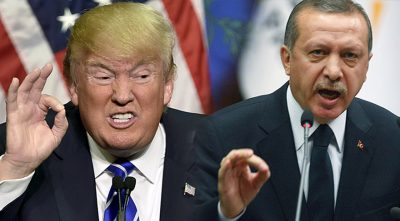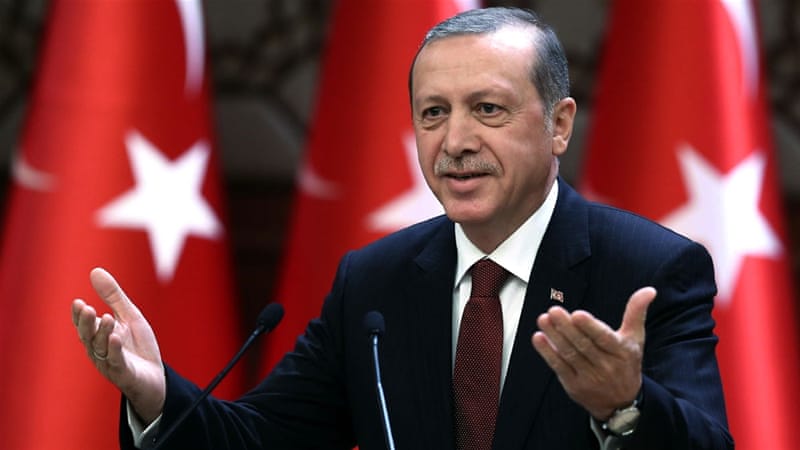The Looming End to the Western-Turkish Alliance?

The growing tension between Turkey and its Western allies, which was further heightened during the Obama administration, is narrowing the space for cooperation between the two sides and in fact is progressively worsening. Erdogan’s hope that he and President Trump would improve their ties as members of NATO has dramatically diminished. Washington and the EU still deeply disagree with Ankara on a host of issues, which are unlikely to be resolved on a mutually gainful basis any time in the foreseeable future.
Turkey’s growing retreat from Western values may have already reached a point of no return. Erdogan has removed Turkey from the Western orbit and set the alliance on a collision course. The falling-out is attributed to the following troubling developments over the past several years.
The most daunting disagreement between the US/EU and Turkey is Erdogan’s systematic destruction of every democratic pillar in his country, including gross human rights violations, closing major media outlets, jailing scores of journalists, and forcefully quelling peaceful demonstrations. In particular, Erdogan exploited the July 2016 attempted military coup to incarcerate tens of thousands of educators, judges, military personnel, lawyers, and anyone else he chose to accuse of plotting against the government. Sadly, the West’s public reaction to Erdogan’s onslaught on human rights was largely underplayed out of concerns that Turkey is still an ally and actively involved in the fight against ISIS.

In this fight, the US from the start has backed the Syrian Kurds and provided its militia (the PYD) with money and military equipment. Whereas the PYD has proven to be outstanding fighters in the battle against ISIS, Erdogan views them as a terrorist organization which is collaborating with the military arm of the Turkish Kurds’ Kurdistan Workers Party (PKK). Erdogan has threatened that he would not allow the US to access Turkey’s Incirlik Air Base if the US continues to support the PYD and prevent the Turkish army from active participation in the fight to retake Raqqa, which would have allowed Ankara to establish a permanent presence in Syria. What irks the US is that instead of focusing on defeating ISIS, Erdogan is fighting the US’ ally (the PYD) which undermines the coalition’s efforts to defeat ISIS.
During the past six years Erdogan began to publicly, with the support of his Islamist AK Party, embrace a religious narrative, and has taken many practical and symbolic steps to Islamize Turkey. He embarked on building thousands of new mosques including 80 in various universities, introduced Islamic studies in school curricula, and legalized the wearing of headscarves for women. In addition, he made Islamic credentials the litmus test for any government post. Erdogan made no secret of his ambition to become the leader of the Sunni Muslim world. Many in the West believe that he is determined to create an Islamic Sunni state fashioned after Shiite Iran, which runs contrary to the Western principle of separation of church and state.
Another conflict between the US and Erdogan was precipitated over Turkey’s demand that the US extradite Fethullah Gülen, whom Erdogan accused of being behind the unsuccessful military coup. Whereas the Turkish government insists that it has provided indisputable evidence that justifies his extradition, the Trump administration (like its predecessor) maintains that it found no sufficient evidence to warrant Gülen’s extradition. In any case, the State Department contends that the Gülen case is not a political matter but falls strictly within the domain of the judiciary. Nevertheless, the conflict over Gülen’s fate continues to sour US-Turkey relations.
Erdogan’s propensity to bully his Western allies has lately reached a tipping point. In recent months, he escalated his criticism of the EU and threatened to annul the agreement over the readmission of refugees who have crossed over illegally into Europe if the EU does not permit visa-free entry for Turkish citizens, as the agreement stipulated. Erdogan’s habitual bullying of his Western allies raises serious doubts about his reliability as a trusted partner and uncertainty about the future of their bilateral relations, especially in connection with issues of national security.
In recent weeks, the tension between the two sides further escalated because of European (especially Germany’s and the Netherlands’) unwillingness to allow Turkish ministers to hold campaign rallies among the Turks living in the EU in support of the upcoming referendum that would grant Erdogan near-absolute powers. He compared the Netherlands and Germany to ‘Nazis and fascists,’ a charge that inflamed the Germans in particular, who are understandably sensitive about the Nazi era. The irony is that Erdogan vehemently denies the Ottomans’ role in the genocide of over a million Armenians, and becomes enraged when this horrific historic episode is attributed to the Ottomans.
 Despite being a NATO member, Turkey is flirting with Russia, which raises serious questions about Erdogan’s loyalty and commitment to the seven decades-old alliance. Erdogan has recently stated that Russia could become an alternate ally to the West, and he is seriously considering purchasing the Russian-made S-400 air defense system. Even though Erdogan might not follow through with his public conjecture about future ties with Russia, the fact that he is even entertaining the thought that he is willing, under certain circumstances, to ally himself with the West’s staunch enemy, sends a chilling signal to the US and Europe.
Despite being a NATO member, Turkey is flirting with Russia, which raises serious questions about Erdogan’s loyalty and commitment to the seven decades-old alliance. Erdogan has recently stated that Russia could become an alternate ally to the West, and he is seriously considering purchasing the Russian-made S-400 air defense system. Even though Erdogan might not follow through with his public conjecture about future ties with Russia, the fact that he is even entertaining the thought that he is willing, under certain circumstances, to ally himself with the West’s staunch enemy, sends a chilling signal to the US and Europe.
More recently, the tension between the US and Turkey was further heightened due to the arrest by the FBI of Mehmet Atilla, vice president for international banking of the state-owned Halkbank, for his violation of US-led sanctions against Iran by assisting Reza Zarrab, a major gold trader who is awaiting trial in the US. It appears that Zarrab acted as an in-between for Turkey and Iran to arrange for Ankara to buy gas and oil from Iran in exchange for gold, which is difficult to trace. Halkbank played a significant role in these transactions, which the Erdogan government supported in violation of US sanctions.
Given the continuing deterioration in the relationship between the West and Turkey under Erdogan, Turkey’s prospect of becoming a member of the EU is essentially over. Moreover, the rise of Islamic extremism has left the EU with little appetite to admit into its ‘Christian’ club an Islamic state governed by a dictator, which is totally inconsistent with Western sociopolitical values. Meanwhile, Turkey’s potential of becoming a true Islamic democracy is wholly and perhaps irrevocably squandered.
In addition, given that Turkey’s population is roughly 75 million, it will be second only to Germany with 80 million. As a member of the EU, Turkey would be in a position to influence the development of every economic, political, and security policy. For the majority of EU members to admit an Islamic state, especially in the wake of the United Kingdom’s departure, is simply a non-starter.
Even more disconcerting is the fact that it is no longer a secret that Turkey’s viability and importance as a NATO member is being discussed not only because of Erdogan’s unruly behavior, but also because Turkey under his stewardship is in violation of the NATO charter. The charter specifically stipulates that the signatories “are determined to safeguard the freedom, common heritage and civilization of their peoples, founded on the principles of democracy, individual liberty and the rule of law”—all of which are being grossly violated by Erdogan.
It is time for the US and the EU to stop downplaying the profound and growing cleavage with Turkey over the many deeply contentious points between the two sides. As long as Erdogan remains in power, their divorce from one another is moving forward at a rapid pace, and there are no powerful voices on either side to sound the alarm about the impending breakup.
It is now left to the Turkish people who want a secular and democratic Turkey with Islamic values to say NO in the April 16 referendum to amend the constitution and deny Erdogan the dictatorial powers he is seeking. Moreover, defying him in the referendum would potentially accelerate his departure from the political scene.
This will save Turkey from being governed by Islamic despotism, and by popular demand gradually restore the country to the Western orbit as envisioned by Mustafa Kemal Atatürk, the founder of the Turkish Republic.
Dr. Alon Ben-Meir is a professor of international relations at the Center for Global Affairs at NYU. He teaches courses on international negotiation and Middle Eastern studies.
[email protected]
Web: www.alonben-meir.com

